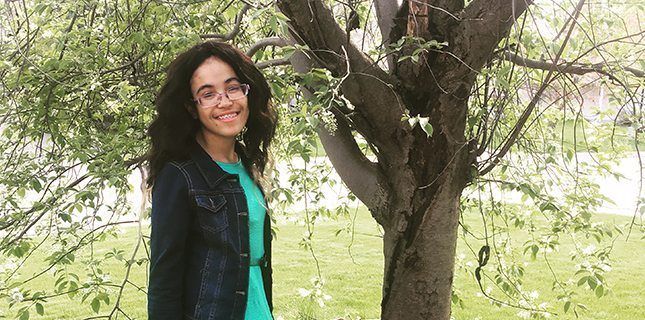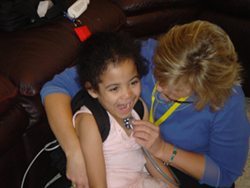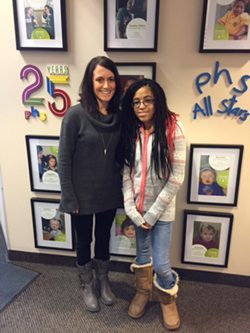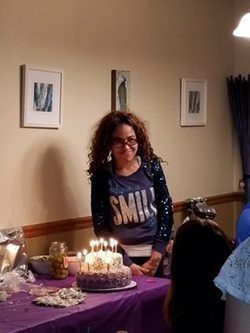TPN Helps Hannah Manage Difficulties With Absorption

16-year-old Hannah spends her time doing a lot of the same things as her peers – going to football games, school dances, and now that it’s summer break, out on the boat. Thanks to total parenteral nutrition (TPN) infusions three times a week and g-tube feedings, Hannah is a healthy, independent teenager with a full future ahead of her.
Digestion Issues Following Birth
After not having a bowel movement following birth, doctors soon diagnosed Hannah with Hirschsprung’s disease, requiring surgery at just three days old to have the majority of her intestines removed.

Due to her complexities as a child that resulted in frequent hospitalizations due to line infections and electrolyte imbalances, Hannah required 24 hour nursing care and lived in a group home for six years before being adopted by a nurse at the home, Gina.
Through all of this, Pediatric Home Service has been working with Hannah and her caregivers to create a comprehensive nutrition and infusion plan that ensures her needs are being met.
Tackling Malabsorption
Hannah’s diagnoses of short bowel syndrome, ulcerative colitis, and Hirschsprung’s disease make it difficult for Hannah’s body to absorb nutrients – requiring a combination of intake methods to help her maintain weight and keep her body functioning well.
 “Between oral eating, tube feedings, and TPN, she needs many more calories than the average person because of malabsorption – and we are constantly evaluating whether her intake is adequate,” said Maria Mahady, who is her PHS dietitian.
“Between oral eating, tube feedings, and TPN, she needs many more calories than the average person because of malabsorption – and we are constantly evaluating whether her intake is adequate,” said Maria Mahady, who is her PHS dietitian.
It is more beneficial to provide Hannah with calories and nutrition through her veins with TPN because her body will absorb these nutrients more readily than if they enter the stomach and go through the digestive system, as Hannah’s g-tube does. Additionally, TPN provides electrolytes – a substance her body struggles to maintain.
“By maintaining tube feedings in addition to TPN, the digestive system is forced to keep working – an important function for the human body” said Maria. “And while she doesn’t absorb enough nutrients to rely solely on tube feedings, her current intake combination is a care plan that works really well for Hannah right now.”
Today, Hannah’s health and stability have improved considerably and her body has grown to depend less on the TPN – allowing for infusions to be reduced from seven days a week to three. And because her TPN is administered at night while she sleeps, life goes on interrupted.
Growing Up Managing Cares
 Having spent her entire life with an ostomy, g-tube, and line for TPN, Hannah has become an expert in her own care – and already at 16 is becoming increasingly independent with managing her needs.
Having spent her entire life with an ostomy, g-tube, and line for TPN, Hannah has become an expert in her own care – and already at 16 is becoming increasingly independent with managing her needs.
“In the future, I look forward to being more self-sufficient with my cares,” said Hannah. “As I’ve gotten older, I’ve been more involved in changing my bag, taking my medicine, and just having control over my medical needs more.”
Maria echoes how capable Hannah already is, and how much potential she has ahead of her as she becomes a stronger advocate and more involved in the conversations happening between caregivers. Recently, Maria has started going to GI appointments with Hannah and Gina, so discussions can happen alongside their doctor as they collaborate in her care.
One Step at a Time
While the care Hannah required didn’t change drastically when she moved out of the group home and into Gina’s house, the responsibility that comes with being the provider and guardian of a medically complex child did have an impact.
 “The biggest transition was realizing that the responsibilities were solely mine now – and that was a bit frightening,” remembers Gina. “But my advice to anybody out there who is intimidated by their child needing infusion is to ask all your questions, and don’t be afraid if you feel like you don’t know everything. Even now, I’m still learning things – it’s a constant learning curve. Take deep breaths, and one step at a time.”
“The biggest transition was realizing that the responsibilities were solely mine now – and that was a bit frightening,” remembers Gina. “But my advice to anybody out there who is intimidated by their child needing infusion is to ask all your questions, and don’t be afraid if you feel like you don’t know everything. Even now, I’m still learning things – it’s a constant learning curve. Take deep breaths, and one step at a time.”
Hannah also adds that while it might seem scary to need infusion therapy at first, the people helping are trying to do what’s best – and it doesn’t mean kids can’t live their life.
“I still get to go on vacation, go to school, go to dances, go hiking,” says Hannah.
What’s ahead for this incoming high school junior who loves math and science? A career in interior design. While she can only design her own bedroom for now, she looks forward to be able to do it for other people someday. And from infants to interior designers, PHS helps its patients get the medical care they need to live full, meaningful lives at home.
Originally published: July 14, 2017

